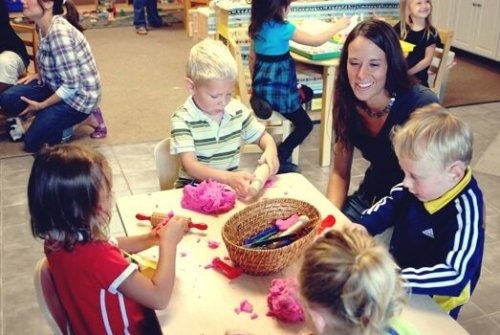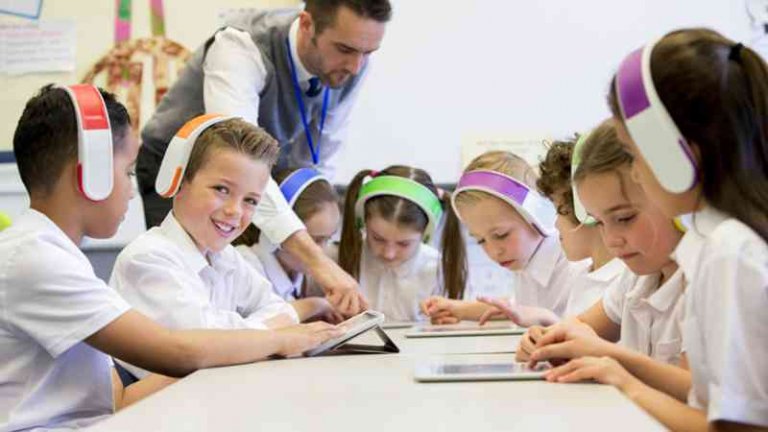Cooperative Work in the Classroom

All schools should incorporate cooperative work. This method is very important and useful, especially for elementary school and middle school students. It uses workgroups to help students develop critical social skills. Through teamwork, students learn how each individual’s effort helps the group achieve its goals.
Children can learn many lessons through teamwork. These days, however, a demanding and rigid curriculum make it hard for teachers to make time for teamwork. This is bad news for students, whose education is limited to theory and memorization of things they never get to put into practice.
The Montessori Method of Education is known for its focus on cooperative work in the classroom. It isn’t an “extra” or a complement to the regular curriculum, but instead the basic foundation of the learning process. Nowadays, many schools use the Montessori Method. However, since Maria Montessori never developed a method for older students, most Montessori schools are elementary.

Cooperative work teaches values
Cooperative work teaches students values that enrich their personal growth and development. It also lets them develop skills that’ll be very useful in the future.
Here are some of the values students can learn from this methodology.
- Individual and group responsibility. If one person doesn’t do their part, the team won’t be able to reach their goal. Consequently, cooperative work helps students develop their sense of responsibility as an individual and as part of a group.
- Humility. When students engage in cooperative work, they feel equal to their peers. Everyone has a task to do, but no one is better than anyone else. They aren’t competing with each other. A good analogy is a team of people rowing a boat. If one person tries to row faster than the others, the boat will tip over. Thus, everyone has to row together.
- Assertiveness. Group projects also help children develop their assertiveness. They learn to manage differences of opinion, say “no” to untenable ideas, and make sure that everyone has a voice. When children learn to be assertive, they also learn the concept of mutual respect.
“Unity is strength… when there is teamwork and collaboration, wonderful things can be achieved.”
-Mattie Stepanek-
How to implement cooperative work in the classroom
Teachers who want to incorporate cooperative work into their classroom have to change whatever methodologies they’ve been using with their students. Although it can be hard at first, having a well-defined plan can help.
Here are the steps that teachers should take:
1. Form workgroups
If teachers want their workgroups to be successful, they have to be thoughtful about their choices. Knowing each student individually is key. So, before implementing cooperative work in the classroom, teachers have to take the time to get to know everyone.

If the students work with different teachers throughout the day, they should all make sure that the students remain in the same workgroups in all their classes. Otherwise, the group dynamics change and it can disrupt the process.
2. Icebreakers and community building
Before starting cooperative work, teachers have to build community within each group. Icebreakers and trust-building activities work well, as they get the students to work together to achieve a goal. That way, they get used to one another and start to develop group awareness.
Study hall is a great time for these activities. Teachers can also work on ways to motivate the groups. Celebrating achievements, no matter how small, is a great way to do that.
“In a world that has so largely engaged in a mad and often brutally harsh race for material gain by means of ruthless competition, it behooves the school to make ceaseless and intelligently organized effort to develop above all else the will for cooperation and the spirit which sees in every other individual one who has an equal right to share in the cultural and material fruits of collective human invention, industry, skill, and knowledge.”
-John Dewey-

The basic goal of cooperative work in the classroom is to help students learn to be independent, while also knowing how to help each other to achieve a common goal. Cooperative work helps them learn better and develop indispensable skills for their everyday lives. This methodology works for every subject and using it in the classroom will help students stay engaged.
All schools should incorporate cooperative work. This method is very important and useful, especially for elementary school and middle school students. It uses workgroups to help students develop critical social skills. Through teamwork, students learn how each individual’s effort helps the group achieve its goals.
Children can learn many lessons through teamwork. These days, however, a demanding and rigid curriculum make it hard for teachers to make time for teamwork. This is bad news for students, whose education is limited to theory and memorization of things they never get to put into practice.
The Montessori Method of Education is known for its focus on cooperative work in the classroom. It isn’t an “extra” or a complement to the regular curriculum, but instead the basic foundation of the learning process. Nowadays, many schools use the Montessori Method. However, since Maria Montessori never developed a method for older students, most Montessori schools are elementary.

Cooperative work teaches values
Cooperative work teaches students values that enrich their personal growth and development. It also lets them develop skills that’ll be very useful in the future.
Here are some of the values students can learn from this methodology.
- Individual and group responsibility. If one person doesn’t do their part, the team won’t be able to reach their goal. Consequently, cooperative work helps students develop their sense of responsibility as an individual and as part of a group.
- Humility. When students engage in cooperative work, they feel equal to their peers. Everyone has a task to do, but no one is better than anyone else. They aren’t competing with each other. A good analogy is a team of people rowing a boat. If one person tries to row faster than the others, the boat will tip over. Thus, everyone has to row together.
- Assertiveness. Group projects also help children develop their assertiveness. They learn to manage differences of opinion, say “no” to untenable ideas, and make sure that everyone has a voice. When children learn to be assertive, they also learn the concept of mutual respect.
“Unity is strength… when there is teamwork and collaboration, wonderful things can be achieved.”
-Mattie Stepanek-
How to implement cooperative work in the classroom
Teachers who want to incorporate cooperative work into their classroom have to change whatever methodologies they’ve been using with their students. Although it can be hard at first, having a well-defined plan can help.
Here are the steps that teachers should take:
1. Form workgroups
If teachers want their workgroups to be successful, they have to be thoughtful about their choices. Knowing each student individually is key. So, before implementing cooperative work in the classroom, teachers have to take the time to get to know everyone.

If the students work with different teachers throughout the day, they should all make sure that the students remain in the same workgroups in all their classes. Otherwise, the group dynamics change and it can disrupt the process.
2. Icebreakers and community building
Before starting cooperative work, teachers have to build community within each group. Icebreakers and trust-building activities work well, as they get the students to work together to achieve a goal. That way, they get used to one another and start to develop group awareness.
Study hall is a great time for these activities. Teachers can also work on ways to motivate the groups. Celebrating achievements, no matter how small, is a great way to do that.
“In a world that has so largely engaged in a mad and often brutally harsh race for material gain by means of ruthless competition, it behooves the school to make ceaseless and intelligently organized effort to develop above all else the will for cooperation and the spirit which sees in every other individual one who has an equal right to share in the cultural and material fruits of collective human invention, industry, skill, and knowledge.”
-John Dewey-

The basic goal of cooperative work in the classroom is to help students learn to be independent, while also knowing how to help each other to achieve a common goal. Cooperative work helps them learn better and develop indispensable skills for their everyday lives. This methodology works for every subject and using it in the classroom will help students stay engaged.
This text is provided for informational purposes only and does not replace consultation with a professional. If in doubt, consult your specialist.







